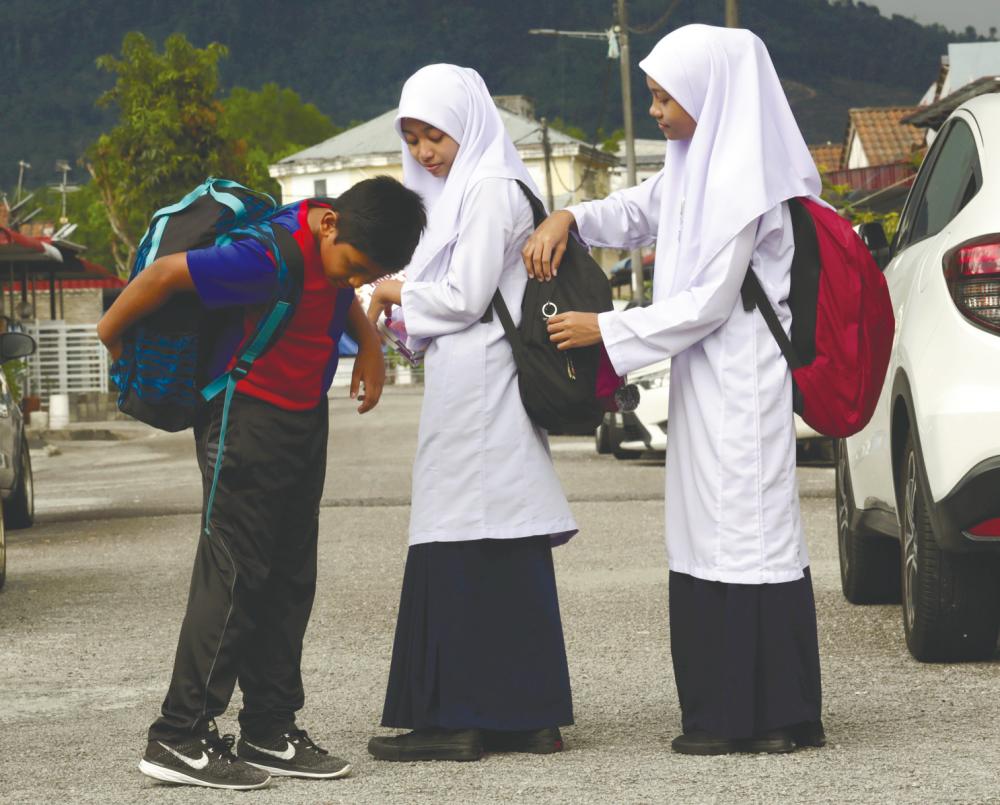PETALING JAYA: Carrying heavy school bags may not just be “unfair” to children as more serious health issues are involved, says a medical expert.
“Children and adolescents do come to my clinic complaining of aches and pains, sometimes attributed to carrying heavy school bags,” Subang Jaya Medical Centre paediatric orthopaedic specialist Dr Roshan Gunalan told theSun.
He explained that the cause of the pain is, however, multifactorial.
“This can depend on the age and size or build of the child, the muscle strength, the time carrying the bag, the weight of the bag and others,” he said.
“However, studies have shown a correlation between carrying heavy bags and the prevalence of musculoskeletal pain, especially back pain.”
Carrying heavy loads tend to cause various problems for children, the most common problem reported includes pain, muscle fatigue and soreness.
“Children have a different composition of bones as compared with adults; in general, they are more pliable and respond differently to stress or load applied to it,” he said.
Children’s bones respond differently to acute injuries such as fractures, and overuse stress, such as repeated carrying of heavy loads.
Parents are always concerned that children develop spine abnormalities and deformities or stunting of growth if they carry heavy loads.
“A study in India found that 60.6% of male pupils and 65.7% of female pupils reported musculoskeletal pain and the most affected areas were back and neck,” he said.
Roshan added neck and shoulder postures were influenced by the weight and duration of carrying heavy bags.
“There have also been significant increases in the thoracic and lumbar spinal curvatures as the children fatigued while carrying the weighted backpacks,” he said, adding that these curvatures are postulated to progress into adulthood, if there is repeated/regular carrying of heavy backpacks.
Stunting of growth, however, is rare, as the long bones and their growth potential withstand repeated stress better, compared with the spine.
When asked the maximum load a child should carry, Roshan said a backpack load exceeding 10% of body weight has been shown to increase energy consumption, increase trunk forward lean, and result in decreased lung volumes.
“These factors lead to reduced efficiency in the breathing and mechanics and eventually fatigue,” he said.
When suggested the use of better-quality bags that may cost more, Roshan said expensive bags may not play a preventive role in these problems in children.
“The content load will still be the same. It is recommended that stroller bags be used as opposed to backpacks,” he said.
As a solution, Roshan suggested schools should be encouraged to provide lockers for children, so that they do not need to carry heavy loads on a daily basis.
Intan Mas Ayu Shahimi, a mother of four, said three of her children are in primary school and they all face the same problem of heavy bags.
“My children always complain they are tired from carrying heavy bags several flights of stairs to reach their classrooms,” she said.
Intan Mas Ayu said there were days her children begged her to allow them either to stay home from school or leave some books at home.
“On average they carry three to four books per subject, and they have five to six subjects per day,” she said.
And to make matters worse, not all the books are used and by end of the school term some pages were left unused.
Intan Mas Ayu pleaded with the Education Ministry to look seriously into the matter before the new school session starts next month.
“For instance, why would physical education class need a textbook and activity book when it is not even an obligatory subject that affects their academics?” she asked.
The heavy school bag issue has been a concern for many years with news reports on it dating back to 1980.










